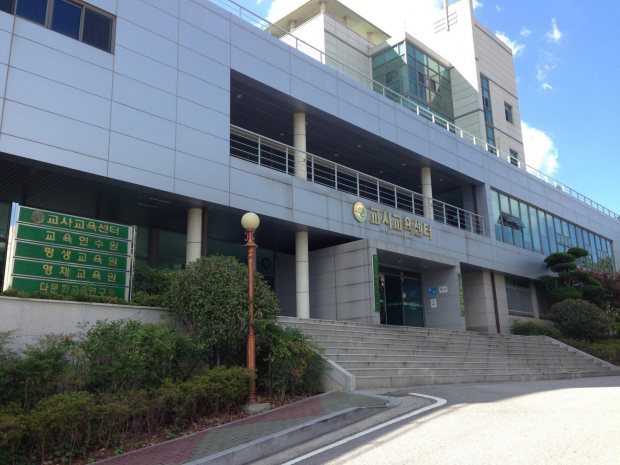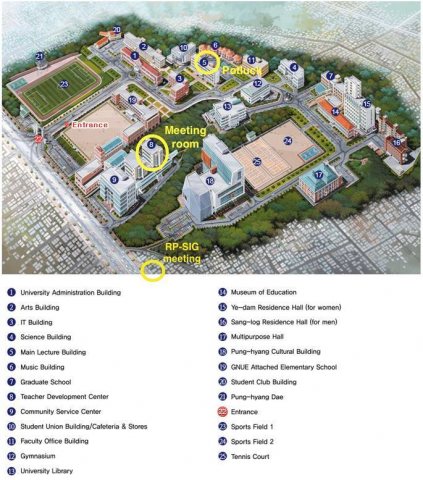
Gwangju-Jeonnam Chapter July Meeting
.
––– Morning Reflective Practice Session –––
Time: 11:00 am - 12:30 pm (2nd Sat., July 8)
Location: Coffee Lab Mujii (formerly Aldersgate. NOT at Kenya Espresso Cafe), near GNUE. (Ground floor of 광주우리교회 Building. Map at bottom.)
ㅡ Topic: Non-violent Communication III
ㅡ Facilitator: Dana Han
––– MAIN MEETING SCHEDULE –––
Time: 2nd Saturday, July 8, 2017, 1:45 - 5:00 pm
Location: Gwangju National University of Education (GNUE), Teacher Training Center (교사교육센터) 1st Floor; Room 811. Detailed directions HERE.
1:45 pm: Sign-in and Meet-and-Greet (Admission: Free for newcomers. Membership welcomed.)
2:00 - 2:50 pm: Presentation 1
ㅡ Tyson's Top 8 Teaching Tips from the CELTA
ㅡ Tyson Vieira (Kyungnam University, Changwon)
2:50 - 3:15 pm: Refreshment Break
3:15 - 4:05 pm: Presentation 2
ㅡ Filling in the Gaps: Starters, Reviews and Closing Activities
ㅡ Andrew Griffiths (Daejeon Education Training Institute)
4:15 - 4:45 pm: Swap-Shop Presentations
Share your Teaching Ideas, Classroom Activities, and Teaching Wisdom with the group.
(Everyone is encouraged to share [up to 5-6 min. each]. Short tidbits are welcomed. Handouts also welcomed.)
4:45 - 5:00 pm: Announcements / Drawing for Door Prizes / Closing
Presentation Summaries and Presenter Biodata
Tyson's Top 8 Teaching Tips from the CELTA
By Tyson Vieira
In the field of ELT (English language teaching), you’ll notice that there are several different certification programs, but the one that seems to keep coming up again and again is the CELTA (Certificate in Teaching English to Speakers of Other Languages). Many teachers that are committed to teaching overseas as a career have earned the CELTA and highly recommend it because of its practical, hands-on teaching experience with one-on-one mentor support.
My CELTA team and I really enjoyed the learning experience and got a lot out of our program; some had no teaching experience and others had over ten years. Entering the program helped to redefine and improve my strengths, to build my confidence in several areas, and to learn new tricks and solidify classroom management and lesson structures. Every teacher has their own unique methodology and teaching style, and therefore, what they gain from their CELTA experience is just as special. This workshop presentation will describe the eight tips that I brought back to Korea from my CELTA experience in Thailand. Then, we will work together in small groups, discussing and practicing each of the eight teaching tips, and later reflect on whether these tips can be just as useful in your day-to-day teaching.
The Presenter
 Tyson Vieira works at Kyungnam University as the Special Programs Coordinator and an English assistant professor. For three years, he worked for the Jeollanamdo Language Program (JLP) under the Provincial Office of Education. He earned his MA degree in TESOL from Azusa Pacific University in California, and his CELTA through International House in Chiang Mai, Thailand. He also served as an RP-SIG co-facilitator and as a member-at-large for the Gwangju-Jeonnam Chapter.
Tyson Vieira works at Kyungnam University as the Special Programs Coordinator and an English assistant professor. For three years, he worked for the Jeollanamdo Language Program (JLP) under the Provincial Office of Education. He earned his MA degree in TESOL from Azusa Pacific University in California, and his CELTA through International House in Chiang Mai, Thailand. He also served as an RP-SIG co-facilitator and as a member-at-large for the Gwangju-Jeonnam Chapter.
____________________
Filling in the Gaps: Starters, Reviews and Closing Activities
By Andrew Griffiths
There are a number of well-known games and activities for language classrooms, but many require time to implement and carry out as they are designed for the later stages of a class. Consequently, these activities do not always “slot in” easily to other periods of a class where a teacher might wish to use them.
This workshop will attempt to redress this by presenting six activities for other parts of the class: two starters, two review activities, and two closing activities. Since these portions of the class are usually relatively short and designed as either precursors or codas to the main body of teaching, the principles guiding these activities are slightly different:
ㅡ They are all quick and easy for the teacher to explain.
ㅡ They are all quick and easy for the students to do.
ㅡ They are all flexible enough for a variety of language learning purposes.
ㅡ The starters are designed to motivate and energize the learners quickly.
ㅡ The review activities are designed to cover a relatively large amount of pre-taught material in a short space of time.
ㅡ The closing activities are designed to allow students to summarize what has just been learned as well as allow the teacher to informally assess how well the students achieved the language goal in preparation for future classes.
The workshop will demonstrate each activity one by one, and as such, attendee participation is greatly welcomed.
The Presenter
 Andrew Griffiths is a teacher trainer at the Daejeon Education Training Institute. He has been in Korea since 2008 and worked first as a public school teacher before moving into teacher training in 2013. He holds an MA in TESOL from the University of Nottingham. His research interests include communicative language teaching in East Asian educational contexts, critical pedagogy, and methods of producing effective classroom English.
Andrew Griffiths is a teacher trainer at the Daejeon Education Training Institute. He has been in Korea since 2008 and worked first as a public school teacher before moving into teacher training in 2013. He holds an MA in TESOL from the University of Nottingham. His research interests include communicative language teaching in East Asian educational contexts, critical pedagogy, and methods of producing effective classroom English.
____________________
Photo: The Gwangju National University of Education (GNUE / 광주교육대학교), Teacher Training Center (교사교육센터), venue for our main meeting - 1st floor, Room 811.




